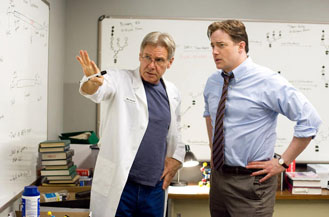|
|
Review: Extraordinary MeasuresBy Matthew HuntleyJanuary 28, 2010
After Megan contracts a fever that almost ends her life, John reacts by flying to Nebraska to speak with Dr. Robert Stonehill (Harrison Ford), whom he's been leaving messages with for a month. Stonehill is an irascible academic who works around the clock conducting research, which has led him to a theory that could potentially offset the fatal effects of Pompe. He's close to creating the enzyme kids would need to break down sugar properly, which would prevent their organs from enlarging. It wouldn't cure them, but it would save their lives. John convinces Stonehill to go into business with him while he and Aileen start a foundation to raise the capital. Stonehill loves the idea because it gives him the freedom to work outside the confines of a large corporation. They set up shop in Nebraska, but their investors threaten to back out if clinical trials aren't started sooner. They strike a deal to merge with the competition, which means more funding but less control. We might have cared about these and other details had the movie not flippantly breezed over them. It cares more about exhausting the emotional family elements. All of the business scenes feel rushed and we aren't given the chance to see or hear what really happens between scientists looking for a cure and businessmen trying to sell a product. This is some edgy material the movie brings up but doesn't actually deal with. Extraordinary Measures is an inherently heartfelt and well-intentioned story, but not for the cinema. It seems better suited for print because it's more informational than emotional. I didn't care too about these people, despite their struggles. I know they're based on real people, but there was something artificial about them that prevented me from investing my heart into their problems. And because any viewer can guess the ending just by watching the opening scene, all doubt is lost that it will be a happy one, and thus all of the incidental events that happen along the way seem unnecessary and tacked on - scenes like John and Aileen getting caught making love on the sofa; John and Stonehill needing to buy a backup generator to save Stonehill's experiments; John having to climb the wall to get Stonehill's attention and cutting himself in the process; or John sneaking into the lab to steal enzymes, a sequence that is played out like a thriller. Director Tom Vaughan fails to ignite these scenes with a sense of urgency or purpose, and so they seem like time-fillers. There's nothing exciting or gripping about them. It pains me to say this, but Harrison Ford does not give a very good performance here. Most of Stonehill's scenes call for Ford to be angry and loud, but Ford plays it over the top and his petulance feels forced. In fact, aside from Fraser, none of the actors really sold me. What John Crowley and Robert Stonehill accomplished in real life was amazing, but their story doesn't make for amazing cinema, at least not the way it's told here. All good movies need a hook that compels us to stay with them to the end, but Extraordinary Measures lacks such a hook. As a wannabe tearjerker, it's dry and uninspired. Given the subject matter, that probably sounds cruel, but for what it's worth, I didn't want write those words.
|

|
|
|

|
Thursday, October 31, 2024
© 2024 Box Office Prophets, a division of One Of Us, Inc.


